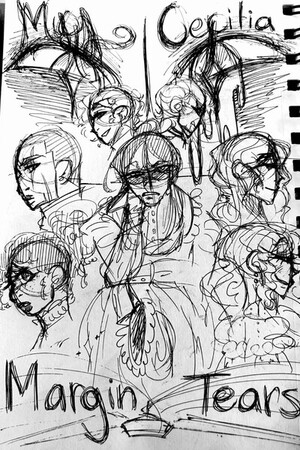Chapter 13:
The Artist
Margin Tears: My Cecilia
Okay, dodging the first romantic advance may have been entertaining, but Cecilia would really rather avoid future run-ins if possible. As such, for the time being, she would absolutely refrain from calling up the obnoxious omnipotence of Dmitri-DMV. Instead, she kept her nose to the grindstone, waiting out the day until she could once again curl in her thin, dusty little bed. As the morning dragged into the afternoon, the young maid had been sent down a corridor she scarcely knew, her arms full of rags and polish, a pail swinging gently in her hand. The air smelled of shut windows and dust—the scent of rooms long unvisited. She was told that the east wing’s guest chambers must be readied; the lord had invited more company to his ball, apparently just one popular event in an eternal procession of soirées and banquets.
The door she tried first creaked open stiffly. The room inside was dim, the curtains drawn, the air stale. She stepped inside without thinking, already rehearsing the motions of stripping linens and scrubbing hearthstone. But she stopped short when she realized the chamber was not empty.
By the far window, propped against a mound of pillows, sat a man. His frame was thin, almost too delicate for the shape of the chair that supported him, that dwarfed him. A blanket was wrapped around his shoulders, though the fire in the grate had gone cold hours ago. His eyes—a pale fever-bright blue rested in sunken sockets framed by thin blond waves—turned toward her with a kind of bemused welcome.
“Oh,” she breathed, nearly dropping her bucket.
“‘Oh’ indeed,” the man echoed softly, his voice both fragile and warm. His lips curved into a small smile, though it managed to touch his eyes. “Forgive me if I frightened you, I do not mean to disrupt your work. Though, perhaps it is I who should feel more taken aback, having a lady suddenly enter my room?”
Cecilia flushed and stammered. “I’m sorry,” she rushed, “I thought—I was told that the room would be empty, sir. I’ll leave immediately.”
“No, no,” he said, gesturing with a pale hand. Thin and bony, blue veins pulsed visibly under the skin. However, with a second glance, one could see it was stained faintly with paint. “Stay, if you please. It has been some time since anyone paid me a visit. Let me believe for a while that I am not yet a ghost among the living.”
She hesitated. He seemed a man of frail constitution—his cough, dry and shaking, portrayed as much—but there was a brightness about him, an intensity that made the shadows around him feel like part of his composition, as though he was melding into it.
Countless materials were scattered on the small table beside him, parchments stacked overtop of one another, lovingly streaked with pencil-lead smears and ink-stained fingerprints. All over were scattered sheets of drawing paper, a sketchbook filled with intricate illustrations, and an inkpot left uncapped, awaiting the next dip of the pen. Cecilia’s gaze caught on the pages, her eyes widened at all of their displayed artistry. Fevered scribbles of poetry, delicate lines of unfinished sketches, swaths of color passionately coated over an unfinished canvas with a trembling hand—All dramatic, wild, and beautifully labyrinthine, a rush of color exuded from a man who seemed drained of it.
“These are lovely,” she breathed, genuine. Her fingers traced the rim of the table before she could stop herself, though she dared not touch the pieces themselves. “You’re an artist, sir?”
“A difficult question. I pretend to be, though my body conspires against me,” he said with a gentle laugh. “Still, if one cannot chase the world’s beauty with strong strides, one must sit and admire what goes unrecognized around them. I paint what I can see from this window, I write what my heart murmurs in its restless hours.” His lungs released a wheeze of a breath, his eyes fluttering closed for a long moment.
Eyes leaving his creations, Cecilia’s admiration turned to concern as she leaned closer to the man. “Sir, are you alright?” She rested a trepidatious hand on his blanket-wrapped shoulder, no heavier than a butterfly’s landing. “Do you need anything?”
Another rasp dripped from between his lips. “I’m fine, I’m fine,” he assured, carefully pushing himself into a straighter upright position. “Creation is…” A sudden cough rattled his ribcage, folding himself in half.
Cecilia jumped, quickly looking around before spotting a water pitcher on his bedside cabinet. She rushed with hurried strides, pouring fresh, tepid water in a half-empty glass before returning to his side. She pressed the glass into his hands, curling his weakened fingers around it. “Please, drink.”
He breathed laboriously, a bead of sweat peaking from his hairline. As Cecilia dabbed at it with a handkerchief, he released a laugh. It was surprisingly humorful, a gentle, musical sound resonating from a sandpaper throat. “So helpful. Thank you, miss.”
Cecilia gave a polite nod. “It’s no problem,” she said. “I’m happy to help.”
She was surprised by how honest those words felt.
“You are Cecilia, yes?”
She kept her expression from shifting. It was far past the point of questioning how her name, or herself, was so known around the manor. “Yes, sir,” she confirmed, firm but gentle, “That’s my name. And what’s yours, if I may ask?”
His smile grew just a touch, yet it seemed so much brighter than before. “Atison,” he answered. “My name is Atison. Now, where was I…” His fingers tapped rhythmically against the chair before they gave a sharp snap. “Ah, yes!” he exclaimed. “Art! Creating it, enjoying it, letting it exist…All of that in and of itself is rebellion, is it not?” He sighed, happy and wistful. “Against isolation, against repression, against decay. It’s all a way to prove we’re all here, living and existing.”
She felt a strange tug at her chest, half pity, half admiration. The manor was full of sternness and shadow, but this room held something altogether different—a refusal to let despair win.
“I shouldn’t keep you,” she murmured reluctantly, though her body did not yet move. “I was sent to prepare these rooms.”
Atison leaned his head back, eyes half-lidded but gleaming. “Then prepare this one for me, Cecilia, if you would. Dust the corners, polish the glass, top my water glass—Make the whole room shine as if I were a guest worth the trouble. Let me imagine I belong, even if I am little more than a withering decoration.”
The words, though lightly spoken, held no bitterness, only a gentle melancholy, tempered by charm.
She nodded slowly, resisting the urge to pull the blanket tighter around his shoulders. As she began to work, she found his gaze following her. It was not a heavy or oppressive look, judging and calculating, but with a painter’s curiosity, as though he was committing to memory how her hands smoothed the coverlet, or the way her hair caught the dim light.
“Tell me,” he asked suddenly, making Cecilia pause to hear his low voice. “Do you find this place beautiful? Do you admire it, or does it weigh upon you?”
Her hand stiffened around the feather duster. Her glanced to the floor, to the door, and she considered carefully. “It is beautiful,” she admitted. “But that doesn’t mean I admire it. It’s beautiful like a natural disaster, making you watch it more out of fear than fascination until you’re well outside its reach.”
His laugh, soft but delighted, ended in a cough, though it was less rattling than the previous fit. “Ah, now that is poetry, Cecilia. We certainly are alike, you and I—We exist in the disaster’s path, and yet we endure.”
She found herself smiling despite the strangeness of the moment, only offering another nod before continuing with her cleaning. They both worked on their respective duties, hers with broom and rag and his with ink and paint, all in a comfortable silence. When her tasks were completed, she gathered her things before walking into Atison’s line of sight, giving a low curtsy.
“Will I see you again?” he asked, voice mild, uncertain.
She hoped so, but she swallowed those sentimental words. Instead, she replied, “If I am sent again.”
He nodded, the heel of his palm stained silver with lead as he continued. “Then I shall hope for dust, cobwebs, and ash-choked hearths,” he said, “That way, you must return.”
She offered another polite nod, hiding her own soft smile before she walked to the door. As she left the room, the image of him lingered in her mind—A figure confined by the limitations of his own body, draped in thick sweaters and thicker shadow. And yet, even so, he clutched stubbornly to beauty, to art, to the small acts of defiance that made life worth living.
Cecilia sighed.
Art truly was inspiring, perhaps more than even Atison knew.




Please sign in to leave a comment.